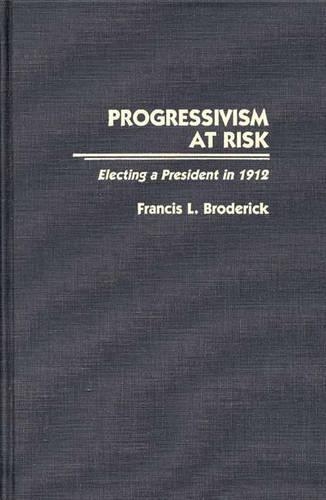
Progressivism at Risk: Electing a President in 1912
(Hardback)
Publishing Details
Progressivism at Risk: Electing a President in 1912
By (Author) Francis L. Broderick
Bloomsbury Publishing PLC
Praeger Publishers Inc
19th May 1989
United States
Classifications
Tertiary Education
Non Fiction
324.9730912
Physical Properties
Hardback
244
Description
Broderick covers the ballyhoo and intrigue of the 1912 presidential campaign with remarkable evenhandedness and realism. He views the race for the White House from the vantage points of the Wilson, Roosevelt, Taft, and Debs camps, and analyzes their strengths and weaknesses accordingly. The book emphasizes the variety of choice offered to the progressive voter in 1912. . . . Broderick makes his points with great clarity and persuasiveness, as well as with detailed examples and anecdotes. This book offers fresh insight into an oft-covered campaign year. Choice The presidential election of 1912 was critical in American history, defining not only the Progressive Era, but setting domestic political standards that remained implicitly or explicitly influential until the second Nixon administration. The election campaign dealt with the central issue of Progressivism: How could the United States develop a strategy for orderly social change in a new economic order created by large-scale industrial capitalism However, in the face of an acknowledged need for reform, there was little agreement on what reforms were desirable. Broderick provides an in-depth picture of the personalities and issues involved in this crucial election. He shows how the four presidential candidates--Roosevelt, Taft, Debs, and Wilson--sought votes for their solutions. In addition to battling each other, the author contends, the candidates struggled for dominance within their own parties. Broderick also considers the influence of Elihu Root, Robert M. La Follette, William Jennings Bryan, Charles Murphy, Champ Clark, and a dozen other political leaders who left their mark on the drama of the campaign of 1912. In conclusion, he demonstrates how, while Wilson won the office, Roosevelt won the debate and shaped the future. This history of an election unique in American politics will be welcomed by political scientists, historians, and the general reader.
Reviews
. . . The story is engagingly and insightfully told. The author makes good use of The New York Times for detail, and he draws effectively on the published papers of Wilson and Roosevelt. He uses, also, the Taft Papers and Debs's fragmentary correspondence. the book materially advances our understanding of the election of 1912.-Presidential Studies Quarterly
Broderick covers the ballyhoo and intrigue of the 1912 presidential campaign with remarkable evenhandedness and realism. He views the race for the White House from the vantage points of the Wilson, Roosevelt, Taft, and Debs camps, and analyzes their strengths and weaknesses accordingly. The book emphasizes the variety of choice offered to the progressive voter in 1912. Broderick sees Roosevelt and Wilson as fellow progressives with sincere differences on specific issues and a profound variance of personal style. Taft is viewed as a conservative with subtle progressive overtones who argued for honest enforcement of legislative measures already in effect. The author shows Debs as a true radical, demanding not reform but the revolutionary change of systems. Wisconsin Senator Robert La Follette, meanwhile, is rightly dismissed as one who played more of a spoiler role opposite Roosevelt in the early primaries, fading from serious consideration after that. Broderick makes his points with great clarity and persuasiveness, as well as with detailed examples and anecdotes. This book offers fresh insight into an oft-covered campaign year. College, university, and public libraries.-Choice
Francis Broderick, has produced a detailed analysis of the presidential election of 1912 as Contributions in History Series, Number 134. . . . This excellent piece of political history belongs in every library and will be especially welcomed by historians and political scientists.-Perspective
." . . The story is engagingly and insightfully told. The author makes good use of The New York Times for detail, and he draws effectively on the published papers of Wilson and Roosevelt. He uses, also, the Taft Papers and Debs's fragmentary correspondence. the book materially advances our understanding of the election of 1912."-Presidential Studies Quarterly
"Francis Broderick, has produced a detailed analysis of the presidential election of 1912 as Contributions in History Series, Number 134. . . . This excellent piece of political history belongs in every library and will be especially welcomed by historians and political scientists."-Perspective
"Broderick covers the ballyhoo and intrigue of the 1912 presidential campaign with remarkable evenhandedness and realism. He views the race for the White House from the vantage points of the Wilson, Roosevelt, Taft, and Debs camps, and analyzes their strengths and weaknesses accordingly. The book emphasizes the variety of choice offered to the progressive voter in 1912. Broderick sees Roosevelt and Wilson as fellow progressives with sincere differences on specific issues and a profound variance of personal style. Taft is viewed as a conservative with subtle progressive overtones who argued for honest enforcement of legislative measures already in effect. The author shows Debs as a true radical, demanding not reform but the revolutionary change of systems. Wisconsin Senator Robert La Follette, meanwhile, is rightly dismissed as one who played more of a spoiler role opposite Roosevelt in the early primaries, fading from serious consideration after that. Broderick makes his points with great clarity and persuasiveness, as well as with detailed examples and anecdotes. This book offers fresh insight into an oft-covered campaign year. College, university, and public libraries."-Choice
Author Bio
FRANCIS L. BRODERICK is Commonwealth Professor Emeritus at the University of Massachusetts at Boston. He is the author of several books, most recently, Reconstruction and the American Negro and Black Protest Thought in the Twentieth Century.
